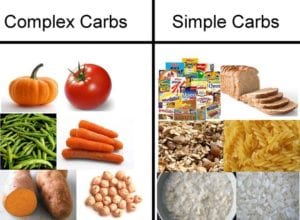June 27, 2017
When we walk into the grocery store almost every single isle is made up of carbohydrate foods. Are carbohydrates that crucial in our diets that they need to make up 80% of the supermarkets? Do they contain the essential nutrients that our body requires? Did you ever wonder what a carb actually is? Are they all created equal?
Hopefully, this will help you and your family make health conscious decisions by providing you with a greater understanding of what carbohydrates are, and how our body uses them.
The Scoop on Carbohydrates
What are carbohydrates?
Carbs are the sugars, starches and fibres found in grains, fruit, vegetables, milk products and of course the convenience foods found in supermarkets.
Does our body need carbohydrates?
When we consume carbs, our digestive system coverts them into glucose, also known as blood sugar. Glucose is needed to provide energy for your brain, nervous system and red blood cells- that is, glucose is burned for fuel or stored as fat. So the answer is yes, we do need it, it is vital to our functioning. However, the amount and type of carbohydrate will determine the effect on the body.
How carbohydrates break down; young or old
Insulin, a pancreatic hormone, is produced by beta cells in your pancreas. Insulin closely regulates our blood glucose (BG) levels and opens the doors to your cells where the carbohydrate or glucose gets used as energy. If insulin is not being used properly in the body, or the supply is short, the body is unable to bring down blood glucose levels to normal as it should.
Diets that are consistency high in sugar and refined grains can cause your body to become insulin resistant over time. This is because you are making your body’s beta cells work harder and harder pushing more and more insulin trying to catch up to the glucose. Not only do you now have high levels of circulating insulin in the body which can cause damage to blood vessels, osteoporosis, heart disease, heart failure and cancer; but the pancreas also becomes tired and sluggish creating resistance over time. This can lead to type 2 diabetes. Type 1 diabetes happens when the immune system attacks insulin producing beta cells in the pancreas. It is an auto immune disease that cannot be resolved by lifestyle and diet. However, this is a topic of its own we will save for another day.

How our stress hormone, cortisol, relates to the consumption of carbs
Cortisol is a counterpart of insulin in addition to our stress hormone. With one of its many important functions, cortisol takes stored sugar in the liver and moves it to the blood stream. When our level of insulin increases, so does our level of cortisol. Insulin is working hard trying to lower blood sugar while cortisol is trying to raise it to keep our body in balance. This is the complex way the body tries to regulate itself. When this happens, hormone deregulation becomes problematic.
High cortisol decreases thyroid function. Normal fluctuation of cortisol levels as it helps regulate BG is not going to affect thyroid function. However, consuming diets high in carbohydrates and high in sugar will have a dramatic effect on both cortisol and thyroid functioning. Eating well and keeping blood sugar levels in acceptable range is crucial for everyone, young or old.
Are all carbohydrates created equal?
Not necessarily. There are 2 types of carbohydrates.
Simple carbs– otherwise known as simple sugars. Because of the little effort required for digestion, they are a quick source of energy. Fruit, fruit juices and milk all contain simple sugars as well as valuable nutrients. Other forms of simple sugars are things like, sugar, candy, processed foods, “white” foods such as white bread, white rice etc. They contain no nutrients and cause blood sugars to rise very quickly. As previously discussed, there are many complications associated with rapid blood sugar spikes. Additionally, it can lead to poor nutrition, tooth decay, lowered immunity, yeast over growth, brain fog, emotional stress, ADHD, depression, anxiety, heart disease and cancer. High refined sugar consumption can also lead to adrenal exhaustion symptoms that include mental and emotional stress, sugar cravings, moodiness and general weakness and lethargy.
Have you ever noticed after eating too much sugar, or a high carb meal you feel symptoms of anxiety, feelings of nervousness, jitters or even upset? This is an issue I personally deal with. Approximately two hours after eating meals high in simple carbs, I will get very jittery and my heart will race. When I had initially noticed it, I wasn’t sure if I was imagining things or if it was fact. When I began researching I couldn’t believe that their were actual studies and material that supported what I was experiencing. When the body releases insulin to put sugar in storage, the insulin response is excessive with too much sugar being put into storage with not enough left in the blood, resulting in symptoms such as weakness and mental fog. The body then responds by dumping adrenaline into the systems. Guess what happens next?? Symptoms from the high adrenaline occur; racing heart and anxiety. The large amount of sweets and carbohydrates triggers the fight or flight response in the body.
Complex Carbs– This type of carb is also called starch. It includes grains, rice and root vegetables. Similar to simple sugar, some complex carbs are better for you than others. When refined grains are processed the nutrients and fibre are stripped from the product. However, unrefined whole grains contain beneficial vitamins and minerals and are fiber rich which aids your body with the digestion process. This slows the release of insulin in the blood. The body much prefers vegetable carbohydrates rather than grain because it slows the conversion to simple sugars and decreases your insulin level. Grains however, can increase your need for insulin and interfere with your ability to burn fat. Although grains can produce good health benefits, moderation remains critically important.
Carbohydrates are very complex in the way they breakdown within the body. As you can see, some carbohydrates are an essential part of our functioning, feeding our brain and our cells. The Canada Food Guide recommends that carbohydrates make up 45-65% of our caloric intake which works out to about 225-325 grams daily. From a holistic perspective, 100g is sufficient. Anything less than this could result in ketosis (which is ok if this is what you are looking for).
It is recommended that the majority of your carbohydrates are made up from vegetables and fruit. This is easier for digestion and your body will thank you for it. Carbohydrates are not all created equal, nor are they all broken down at the same rate. Carbs are definitely your friend when you choose wisely.
Be aware, eat consciously, and make good choices.


